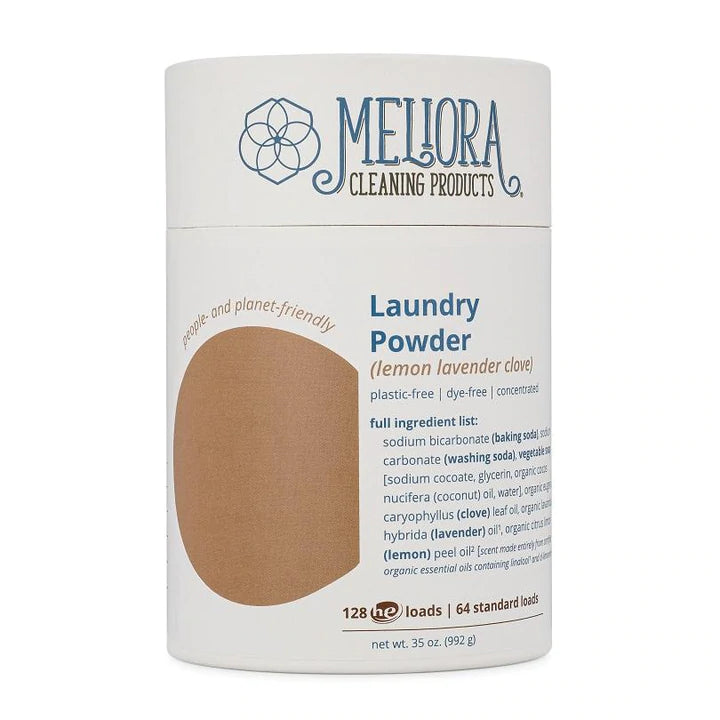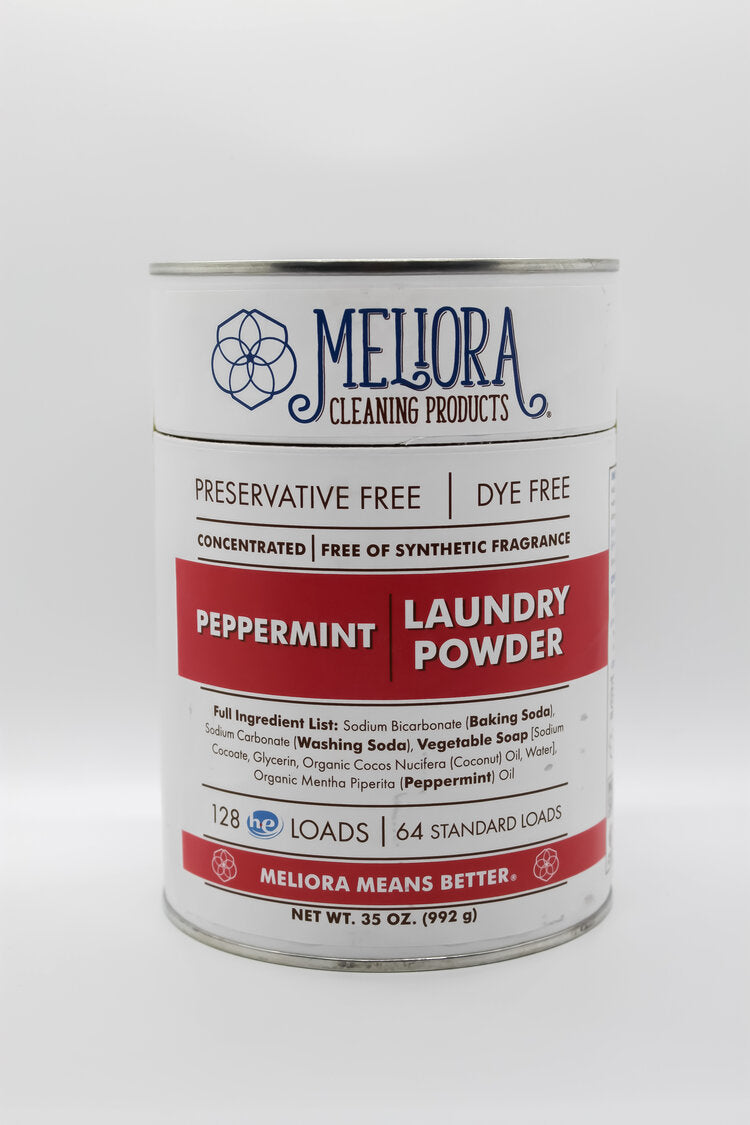Meliora Cleaning Products
Laundry Powder - 128 HE (64 Standard) Loads
Couldn't load pickup availability
✓ 100% Plastic-Free
✓ Dye-Free
✓ Preservative-Free
✓ Palm-Oil Free
✓ Cruelty-Free
✓ Synthetic Fragrance-Free
All Laundry Powder now comes with a reusable METAL scoop! Laundry is now 100% plastic-free!
Our Laundry Powder is your go-to people- and planet-friendly laundry option. We only use what you need to clean your clothes. All our Laundry Powders are free of synthetic fragrances, dyes, preservatives, and brighteners.
Choose from our original Unscented, or our Lavender, Lemon, or Lemon-Lavender-Clove scented options. All scents are made from Certified Organic essential oils; no fragrance blends that contain undisclosed ingredients.
Each item is Vegan, Cruelty-Free, and MADE SAFE Certified. 1% of every sale goes towards environmental causes.
Instructions for use:
Add Laundry Powder directly to washer with clothes
- For HE Washers, use 1/2 scoop (1/2 tablespoon)
- For Standard Washers, use 1 scoop (1 tablespoon)
Our Laundry Powder canister contains 128 HE (64 Standard) Loads. Our best seller. A great value, too. The cardboard/steel canister is easy to recycle or reuse. Comes with a stainless steel scoop. Net Wt. 35 oz.
Full Ingredient List [UNSCENTED]: Sodium Bicarbonate, Sodium Carbonate, Vegetable Soap [Sodium Cocoate, Glycerin, Organic Cocos Nucifera (Coconut) Oil, Water]
Full Ingredient List [LAVENDER]: Sodium Bicarbonate, Sodium Carbonate, Vegetable Soap [Sodium Cocoate, Glycerin, Organic Cocos Nucifera (Coconut) Oil, Water], Organic Lavandula Hybrida Grosso (Lavender) Oil
Full Ingredient List [LEMON]: Sodium Bicarbonate, Sodium Carbonate, Vegetable Soap [Sodium Cocoate, Glycerin, Organic Cocos Nucifera (Coconut) Oil, Water], Organic Citrus Medica Limonum (Lemon) Peel Oil
Full Ingredient List [LEMON LAVENDER CLOVE]: Sodium Bicarbonate, Sodium Carbonate, Vegetable Soap [Sodium Cocoate, Glycerin, Organic Cocos Nucifera (Coconut) Oil, Water], Organic Euginia caryophyllata (Clovebud) Oil, Organic Lavandula Hybrida Grosso (Lavender) Oil, Organic Citrus Medica Limonum (Lemon) Peel Oil
Nerd Alert: More Detailed Information On Ingredients:
- Sodium Bicarbonate: Also known as baking soda, sodium bicarbonate is an odor neutralizer.
- Sodium Carbonate: Also known as washing soda or soda ash, sodium carbonate is a pH adjuster. It raises the pH of the washing water, which results in more effective cleaning. For this reason it's often referred to as a laundry 'booster'.
- Vegetable Soap:
- Sodium Cocoate: This is the chemical name of saponified (that is, 'made into soap') coconut oil. It's the chemical that grabs onto both dirt and water to do the cleaning.
- Glycerin: This substance is chemically a type of alcohol and is naturally created when the oil is converted into soap. Glycerin is known for skin-softening abilities and is an effective solvent, meaning it can dissolve substances such as stains and dirts.
- Organic Cocos Nucifera (Coconut) Oil: There is a small amount of coconut oil left in the soap after conversion to sodium cocoate. This is because we use sodium hydroxide, or lye, in the conversion process and leaving excess oil ensures there is no remaining lye in the finished product. Some soapmakers refer to this as 'superfatting' and more oil remaining results in a softer, more moisturizing soap. Our coconut soap has only a small amount of excess oil, so it is not the luxurious body type and more of a 'get the job done' soap.
- Water: Water is used in the soapmaking process as a substance that dissolves lye and then is a medium so the lye can reach all of the oil to react. After being useful in this process, the water is allowed to evaporate from the soap over a period of several weeks, and the resulting dried soap has very little water. There is only about 5% water remaining in the finished soap, thus making it more shelf stable than a liquid soap that would require a preservative due to the high (about 60%) water.










